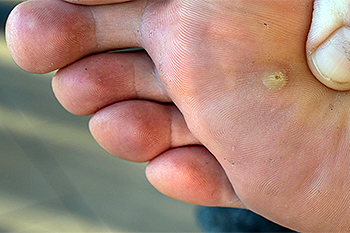
The medical name for a plantar wart is called verruca. This type of wart is located on the bottom of the foot, and it grows inward as a result of standing and walking for most of the day. It can cause severe pain and discomfort, and it may be difficult to complete daily activities. It can develop from contracting the human papillomavirus (HPV), and it is often contagious. The virus can enter the body through small cuts in the skin on the feet, and it is found in places that can include public swimming pools. Additionally, this virus can live on shower room floors and may also be found in locker rooms. These environments are warm and moist and are the perfect area for HPV to live. The wart appears as a small, thick area of skin on the heel or on the bottom of the toes, and it may have tiny black dots in the center. There are several methods of relieving the pain from a plantar wart, and it is advised that you confer with a podiatrist who can discuss proper treatment techniques with you.
Plantar warts can be very uncomfortable. If you need your feet checked, contact Tanisha Richmond, DPM from Richmond Foot & Ankle, LLC. Our doctor will assist you with all of your foot and ankle needs.
About Plantar Warts
Plantar warts are the result of HPV, or human papillomavirus, getting into open wounds on the feet. They are mostly found on the heels or balls of the feet.
While plantar warts are generally harmless, those experiencing excessive pain or those suffering from diabetes or a compromised immune system require immediate medical care. Plantar warts are easily diagnosed, usually through scraping off a bit of rough skin or by getting a biopsy.
Symptoms
- Lesions on the bottom of your feet, usually rough and grainy
- Hard or thick callused spots
- Wart seeds, which are small clotted blood vessels that look like little black spots
- Pain, discomfort, or tenderness of your feet when walking or standing
Treatment
- Freezing
- Electric tool removal
- Laser Treatment
- Topical Creams (prescription only)
- Over-the-counter medications
To help prevent developing plantar warts, avoid walking barefoot over abrasive surfaces that can cause cuts or wounds for HPV to get into. Avoiding direct contact with other warts, as well as not picking or rubbing existing warts, can help prevent the further spread of plantar warts. However, if you think you have developed plantar warts, speak to your podiatrist. He or she can diagnose the warts on your feet and recommend the appropriate treatment options.
If you have any questions please feel free to contact our office located in Dayton, OH . We offer the newest diagnostic and treatment technologies for all your foot and ankle needs.